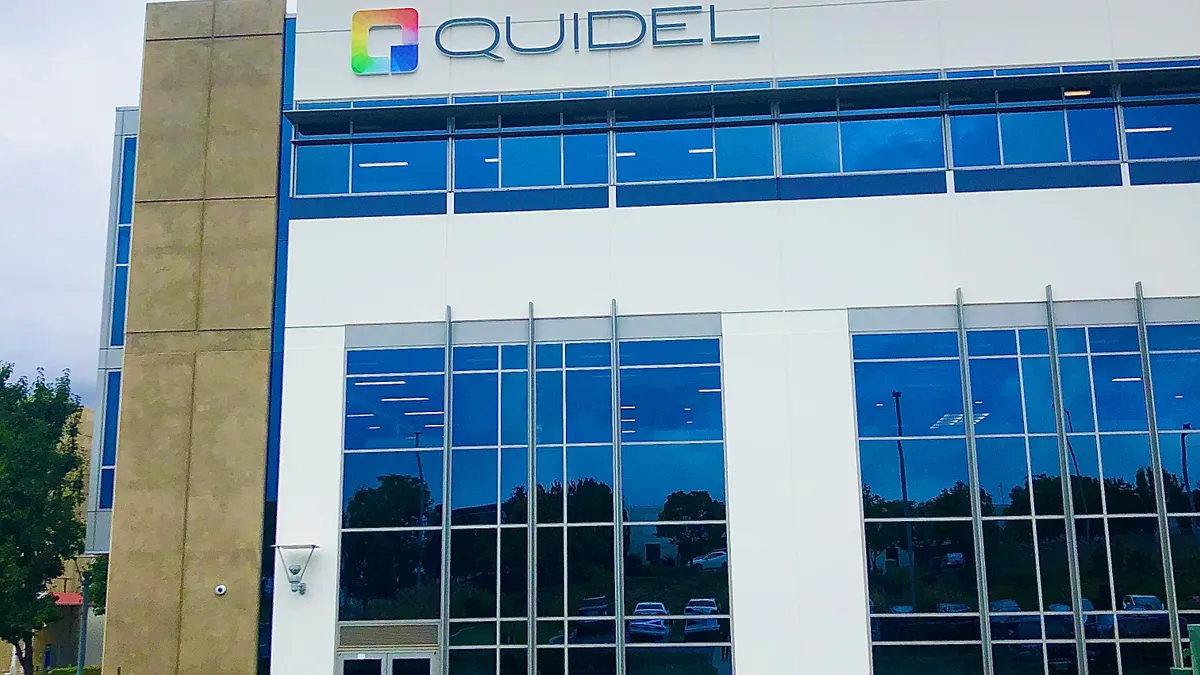By the numbers, 2020 has been an extraordinary year for Quidel and its CEO Doug Bryant. The San Diego-based diagnostics company has delivered record profit and revenue over two successive quarters since the coronavirus pandemic took hold.
Quidel in late October reported third-quarter revenue of more than $476 million, a 276% increase compared to the prior year, driven by demand for coronavirus testing. And, Quidel expects $800 million or more in revenue in the fourth quarter as the number of confirmed U.S. COVID-19 cases surges.
Susan Van Meter, executive director of AdvaMedDx, said it is not surprising that Quidel was the first COVID-19 antigen test to receive emergency use authorization from FDA. "That is Quidel's sweet spot. They have done a lot of point-of-care antigen testing over time," Van Meter observed. "Doug got started very early on."
It's been a long time coming for Bryant, who has led the company for nearly 12 years and "with hindsight" deserves much of the credit for setting Quidel up for success when the pandemic hit earlier this year, according to analyst Alex Nowak of Minneapolis investment firm Craig-Hallum.
Under Bryant, Quidel prior to COVID-19 put resources into point-of-care antigen testing for infectious disease once considered a niche within the diagnostics industry, Nowak said, noting that before the pandemic the company's business was largely centered around flu testing but they made significant progress in diversifying.
Nowak points to Quidel's $680 million acquisition in October 2017 of Alere's Triage assets, which added an extensive cardiovascular and toxicology point-of-care offering to its portfolio of diagnostics for diseases and conditions such as flu, RSV and strep, among others.
"He had a strategy pre-COVID that point-of-care antigen testing was the right way to address infectious diseases like flu and strep, and all the while he was getting pushback from investors and industry that molecular POC was going to take over. But he stuck to his guns," Nowak said.
Quidel’s rapid immunoassay technology was developed over years. And, when COVID-19 reached pandemic level in early 2020, the company redirected to focus on the virus. Bryant said in November at the company's virtual investor day that Quidel "already had all the elements needed to play a significant role in SARS testing."
Quidel developed and manufactured one of the first polymerase chain reaction (PCR) assays to meet the growing demand for COVID-19 testing, with its Lyra assay getting an EUA in March. However, the most significant development in 2020 has been the company’s rapid point-of-care antigen test which in May became the first such diagnostic to get an FDA nod.
The company in the third quarter more than doubled manufacturing capacity to over 2 million antigen tests per week and plans to triple that number to as many as 6 million tests a week by mid-2021, according to Bryant.
"It's a big logistical challenge," Nowak observed. "They are having to vertically integrate some of the supplies within their own manufacturing chain."
Bryant, who worked at Abbott for more than 23 years, said in November that he likes the David versus Goliath dynamic.
"We've got 1,300 people and we're competing in a world where our competitors are significantly larger," he noted.
The company's key product, though, has come under scrutiny and it faces questions about how long demand will last.
The accuracy of Quidel's Sofia SARS antigen test was called into question this fall. A University of Arizona study, as reported in November by The New York Times, detected only 32% of the positive cases among those with no symptoms that were identified by a PCR test, considered to be the gold standard for detecting SARS-CoV-2 infections.
When used in samples from symptomatic patients, Quidel’s kit detected 80% of the infections found by PCR testing. A Quidel spokesperson declined to comment until the data is published and peer reviewed.
Further, good news for eventual taming of the pandemic with vaccines has put a damper on enthusiasm for testing. Quidel shares fell 28% on Nov. 9 on news of vaccine result shared by Pfizer and BioNTech, which found the shot to be more than 90% effective.
A week later, Moderna announced its vaccine had 94.5% efficacy in preventing COVID-19 compared to a placebo. Quidel’s stock has still not recovered to its earlier pandemic-level highs.
While there is optimism with the vaccines, there must also be "appropriate caution," Bryant told investors in November. "The coronavirus is constantly mutating." As a result, the virus could behave differently in the future, said Werner Kroll, Quidel's senior vice president for research and development.
Quidel is anticipating there will be changes in the coronavirus following the wide availability of vaccines, Kroll said, emphasizing the importance of monitoring the possible emergence of new variants of SARS-CoV-2. At the same time, Bryant said Quidel's rapid antigen tests will still "be appropriate" even if the virus mutates.
Looking ahead, Bryant contends the level of tests required for the ongoing pandemic will "persist well beyond 2021" and perhaps later.



 Read more
Read more










